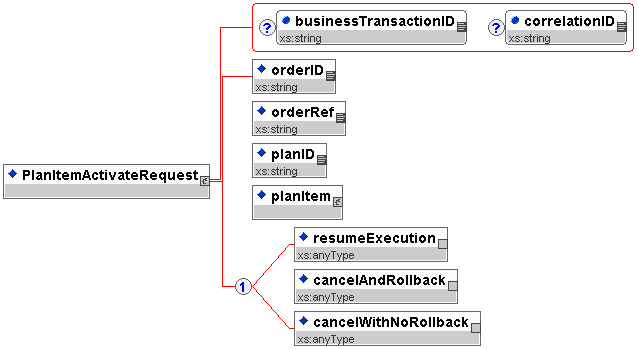Plan Item Activate Request Event
Plan Item Activate Request Event is sent by Orchestrator to a Process Component to request activation of a previously suspended plan item. It is received by the Process Component, which then resumes, cancels with roll back, or cancels without roll back. It is an asynchronous event to a JMS queue. There is no specific response to a Plan Item Activate Request Event, however the Process Component is expected to complete processing and return a Plan Item Execute Response Event as usual.
For example, if the owner value in the plan fragment model is BPM, the destination would be tibco.aff.orchestrator.planItem.BPM.activate.request.
The event has the following properties:
| Property | Type | Cardinality | Description |
| processComponentID | String | Required | Unique identifier for the Process Component to be executed. |
| processComponentName | String | Required | Name of the Process Component to be executed. This is the name as configured in the Process Component Model for the specified processComponentID. If there is no model specified then this field is null. |
| processComponentVersion | String | Required | Version of the Process Component to be executed. This is the version as configured in the Process Component Model for the specified processComponentID. If there is no model specified then this field is null. |
| processComponentType | String | Required | Type of the Process Component to be executed. This is the type as configured in the Process Component Model for the specified processComponentID. If there is no model specified then this field is null. |
| processComponentRecordType | String | Required |
It is a class of processComponentType. This is the processComponentRecordType as configured in the Process Component Model. If there is no model specified then this field is null. |
| JMSPriority | Integer | Required | It is the standard JMS message priority to be sent in the outbound message to support order priority. |
| originator | String | Optional | The value of the NODE_ID that is assigned to the instance. This property is sent by the Orchestrator in all the outbound JMS messages and is expected to be mapped back by the external systems (process components, feasibility providers, pre-qualification failure handlers, and error handlers) in the corresponding response messages. |
The payload specification is as follows:
The following table lists the details of the elements.
| Element | Type | Cardinality | Description |
| businessTransactionID | String | Optional | Unique identifier for tracing purposes across function calls. |
| correlationID | String | Optional | Unique identifier to correlate the request message with a response message. |
| orderID | String | Required | Internal unique identifier for the order associated with the plan containing the plan item to activate. |
| orderRef | String | Required | External unique identifier for the order associated with the plan containing the plan item to activate. |
| planID | String | Required | Internal unique identifier for the plan that contains the plan item to activate. |
| planItem | Type | Required | Plan item type for the plan item to activate. See Appendix A for the specification of this type. |
| resumeExecution | Type | Required, Choice | Flag indicating that the Process Component must resume execution from the point where it was previously suspended. |
| cancelAndRollback | Type | Required, Choice | Flag indicating that the Process Component must cancel execution and roll back previously completed tasks. |
| cancelWithNoRollback | Type | Required, Choice | Flag indicating that the Process Component must cancel execution and not roll back previously completed tasks. |

